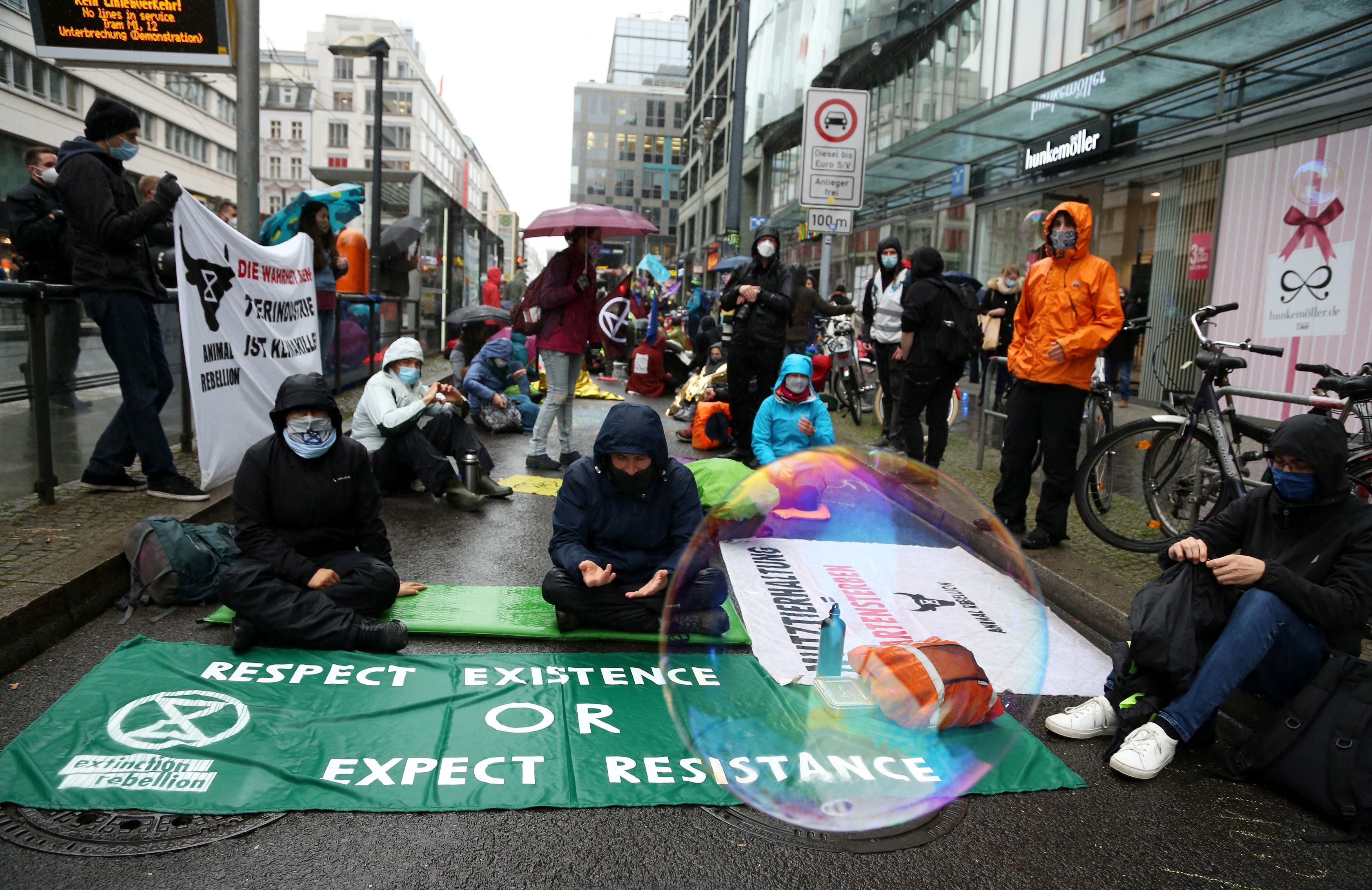No babies for the climate
30-07-2022
Opinion
Norbert Schäfer, PRO

Photo Unsplash
Opinion
The fact that people are consistently and fiercely committed to preserving nature is respectable. But environmental protection can also take radical forms. Some activists do not even shy away from human self-sacrifice to save the world.
In January, environmental activists stuck themselves to the roadway in front of Berlin's central railway station. Their sit-in blockade brought traffic in the city centre to a partial standstill. With this action, the environmentalists wanted to draw attention to the harmful consequences to the climate caused by CO2 produced by car traffic. "Extinction Rebellion" and the climate activists of "Last Generation" have set themselves the goal of averting the extinction of plants and animals due to the climate crisis and saving humanity from extinction. To do this, they rely on civil disobedience.
Because of the negative impact of humans on the environment and the fear that life on the planet could soon no longer be worth living, some climate protectors are even pursuing the approach of renouncing their descendants. This is probably the most radical form. The idea: no people, no climate problems. "Birthstrike" is a variety of antinatalism. Behind it is the philosophy of not producing offspring for ethical reasons, such as reducing one's ecological footprint. "You can protect children and fight climate change and systematic corruption simultaneously by refusing to procreate!" reads the movement's English website. Refraining from having children is "the most influential decision a person can make to reverse climate change". How many people adhere to this belief is not known.
No child = 58.6 tonnes less CO2
Seth Wynes and Kimberly Nicholas claim to have proven in a study in 2017 that there is considerable potential for reducing greenhouse gas emissions by not having children. For this, the scientists from Lund University examined various other studies and calculations. They found that not driving saves 2.4 tonnes of CO2 equivalents per year. Those who abstain from air travel save about 1.6 tonnes of CO2, and vegetarian food 0.8 tonnes. If you want to do something really good for the climate, you should decide against having children. Doing without a child saves 58.6 tonnes of CO2 per year.
The birth-strike movement is also driven by downright climate fear among young people. According to neuroscientist Emma Lawrance, 40 per cent of 10,000 young people between the ages of 16 and 24 do not want to have children because of climate change. The US association, "The Voluntary Human Extinction Movement", has been preaching since the 1970s to restore a "healthy state" on Earth through the "slow extinction of the human race by voluntarily giving up procreation".

In Germany, the movement became popular through the activist Verena Brunschweiger. In her book "Kinderfrei statt kinderlos" (Child-free instead of childless), the author pleads for renouncing children for the sake of the climate. But it is not only women who refuse to bring offspring into the world. In March, the weekly newspaper Die Zeit reported on Swiss activist Marc Fehr. "I believe that the planet is already overpopulated and does not need more people," Fehr told the newspaper. Consequently, for climate policy reasons, the man had opted for a vasectomy, the severing of the vas deferens, in 2020. "I'm concerned about the environment and climate change, and although I eat meat and fly occasionally, I think not having children has a big impact on my ecological footprint."
Environmental protection takes on religious overtones
A study from 2014 shows that fewer children do not mean a quick solution to environmental problems. The study examined the development of the world's population by 2100 based on fertility and mortality rates. It concluded that even with a globally imposed one-child policy and catastrophic mortality events, there would probably still be five to ten billion people living on Earth by 2100. So whether childlessness helps the climate is something of a matter of faith. In Germany, birth rates are no longer sufficient for reproduction anyway.
"In recent times, it has been increasingly pointed out critically that social movements such as those for the protection of the environment partly take on religious traits," explains Kai Funkschmidt, scientific advisor at the Protestant Central Office for Worldview Questions (EZW). There is a tradition within the movement that sees itself as primarily spiritually religious. In the ecological movement, an initially harmless devotion to nature has taken extremist forms. Much of the climate movement is dogmatically charged, has apocalyptic features or sets absolute, sometimes utopian goals with a kind of intolerance. The time before the climatic fall from grace, industrialisation, is glorified as a paradise to be regained. Yet, Funkschmidt notes, this time was marked by poverty, infant mortality, illness and hard work from infancy onwards.
However, clerics also help to bring climate protection linguistically close to religion. In a sermon, the former president of the Council of the Protestant Church in Germany, Margot Käßmann, lumped the eco-activist Greta Thunberg together with the Old Testament prophet Jeremiah. In connection with Thunberg, Berlin's Catholic Bishop Heiner Koch wanted to "remind us that our society and our church need real prophets from time to time who point out grievances and undesirable developments and suggest ways of solving them."
Dogma instead of science
"Hardly anyone seriously disputes that we have massive ecological problems," says Funkschmidt. "But the claim that the climate can be saved in a quasi-spiritual way, through a new image of humanity that we force on people, without technical means, because technology got us here in the first place, that doesn't do justice to the problem." Funkschmidt criticises the dogmatism of many climate activists. The only solution to climate change, he says, is to reduce CO2 emissions by doing without fossil fuels - or children. Other solutions are no longer discussed because they go against the existing dogma and are therefore considered morally reprehensible: nuclear energy, for example. Nuclear energy, for example, would demonstrably reduce CO2 emissions but is considered evil and therefore out of the question, Funkschmidt explains.
The polyphony of science is largely ignored in the ecological movement and seen as a monolithic block with a single insight. The complexities of nature, environmental protection, and ecosystems are summarised in one number: "Two degrees. A sacred number." The two-degree target describes the goal of international climate policy to limit global warming to less than two degrees Celsius by 2100 compared to the level before industrialisation began. "In the climate movement, often only one's interpretation of science counts as the only way to salvation. We know that from religion, too."

Funkschmidt points to terms in the climate debate with religious overtones. "The talk is that we have to save the planet." Saving the world is a classic motif of religions. In a figurative sense, the CO2 footprint can be seen as a kind of sin that account for environmental sins committed. "Anyone who criticises quickly runs the risk of being branded a climate denier," says the religious scholar. That is equivalent to maximum moral discredit. Similar to the Holocaust denier or the God denier who knows the revealed truth but vehemently denies it.
In connection with the climate, people like to talk about guilt, a religious category. Man sins against nature, which confronts man as a person: for example, when it is said that Corona, climate change or the flood disaster in the Ahr valley were a "revenge of nature". Nature is linguistically treated like God.
Even the refusal to bring offspring into the world can be explained quasi-religiously: as a sacrifice. Birthstrike as the ultimate asceticism. "If I don't already kill myself because I'm a climate sinner, then at least leave the planet childless. It is the ultimate sacrifice that I take myself out of the reproductive chain." Funkschmidt considers the move more radical than celibacy, which exists in many religions. This way of life is supposed to serve the attainment of salvation. For Martin Luther, however, the promise of celibacy in the Catholic Church was the prime example of human presumption to do something for the salvation of the soul through one's willpower.
"It is in no way God's will for us as his creatures that we cease to exist, that we hate ourselves so much that we take ourselves out of the world as human beings," says Funkschmidt, referring to the Book of Genesis in the Bible: there the whole creation is commanded by God to multiply. The theologian advises common sense in dealing with climate problems. "God will not simply change the climate, but we must already think about what we have to do to make the consequences as manageable as possible." In doing so, he said, churches should remind people that climate is not about good fighting evil and that climate is about penultimate things. "God determines the time and the hour when this world will end," says Funkschmidt. Until then, people should treat everything with care and preserve their bodies as God's temples and the creation's surroundings.
This article was translated by CNE.news and previously published in Christian German magazine PRO on July 6th, 2022.
Related Articles






